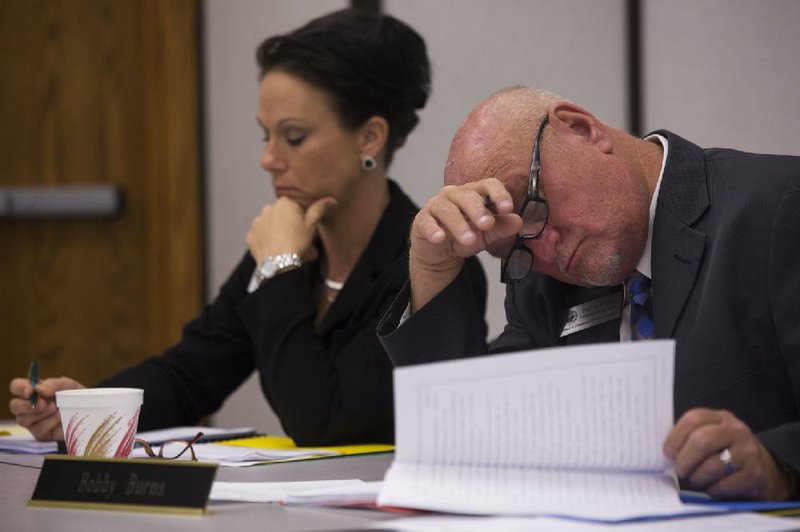An attempt to build a crematorium near a Russellville-area school was delayed by a state board Thursday over pollution concerns from residents and questions about the legality of a proposed procedure.
For the second time, the state Board of Embalmers and Funeral Directors in Little Rock tabled a proposal from Humphrey Funeral Service to build a crematorium 350 feet from Center Valley Elementary.
Last month, Russellville residents testified at a public hearing that they believe emissions from the crematorium -- such as mercury, particulate matter and dioxides -- would harm their children and cause their property values to plunge.
According to a permit issued by the Arkansas Department of Environmental Quality, the crematorium would meet state emission standards for six pollutants, including those listed above. It could burn up to 175 pounds per hour and 764 tons per year.
This would be the first crematorium in Pope County. The nearest one is in Yell County. In 2013, Humphrey Funeral Service performed 60 cremations using a private contractor. If the new crematorium is built, the company could perform up to 200 per year within the next 10 years.
The Food and Drug Administration does not enforce federal standards for crematorium emissions in the Clean Air Act because it does not consider human bodies "solid waste." As a result, states are responsible for creating their own regulations.
In a bid to help resolve the conflict, funeral home President Jim Bob Humphrey suggested extracting dental amalgam, which is partly composed of mercury, used in fillings and crowns prior to cremations. During cremations, such mercury vaporizes at high temperatures and is released into the air.
If the state board approves Humphrey's permit to begin construction and grants him a licence to operate and he moves forward with the plan for dental amalgam extractions, the crematorium would be the first in North America to do so.
"This is the equivalent in my industry to inventing another printing press," said Humphrey, a Russellville resident. "It's revolutionary."
Though Humphrey hopes to pioneer amalgam extraction, his initiative could be blocked by the state Board of Dental Examiners.
"I did speak to the dental board, and they will discuss it at their next meeting on Sept. 19," said Amy Goode, the state Board of Embalmers and Funeral Directors' executive secretary. "On its face, it would appear that this is practicing dentistry without a license."
For those in the Baby Boom generation and older, an adult mouth generally contains about 2 grams of mercury, which vaporizes at 700 degrees Fahrenheit during cremation and is then released into the air, according to the Cremation Association of North America. It's not clear how far such an emission spreads, said its executive director, Barbara Kemmis.
Mercury dental fillings are less common in younger generations.
Kevin O'Dwyer, the dental board's attorney, said anyone in Arkansas who is practicing dentistry as defined by the state's rules and regulations and the board is required to hold a licence.
"Typically, the way these questions are answered is that someone writes to the board and asks for clarification on something," O'Dwyer said. "The board will discuss it and look through the rules and regulations to see if it is in the scope of the practice of dentistry."
To construct a crematorium in Arkansas, the state Embalmers and Funeral Directors board must approve a permit, publish a notice in a local newspaper two weeks before a public hearing, send letters to nearby residents, and hold a public hearing in the city or county where the crematorium is planned, according to Arkansas Code 17-29-313.
A public hearing held in Russellville on July 29 lasted three hours as board members heard testimony both supporting and opposing the crematorium.
Scott Steuber said at the hearing that he didn't want his two sons, ages 6 and 4, going to school next to known pollutants.
"I can't think of a place to have higher environmental standards than next to an elementary school," Steuber said. "We wouldn't build an elementary school next to a source of known pollution, so why would we do it backwards?"
In Russellville, a funeral home, mortuary or undertaking establishment is not permitted in any residential zone, although the city's ordinance does not specifically address crematoriums. Since the elementary school is outside the city limits, however, zoning requirements do not apply.
The crematory unit would be manufactured by Matthews International Cremation Division.
While most states require that particulate matter emissions -- which are produced from the body, the casket and other items cremated with the body -- remain below .08 part per million per hour, Matthews crematoriums emit between .02 to .04 part per million per hour, said a Matthews sales consultant. The crematorium also includes an after-burner chamber where the combustion of any gaseous materials can dissipate.
"I think a lot of people don't understand what a crematorium should look like. There's not a lot of smoke coming out; there's heat coming out," Bobby Thurman, vice president of the Embalmers and Funeral Directors Board said at the meeting Thursday. "If there's smoke, you have an issue, and you have to shut it down."
State Desk on 08/15/2014

